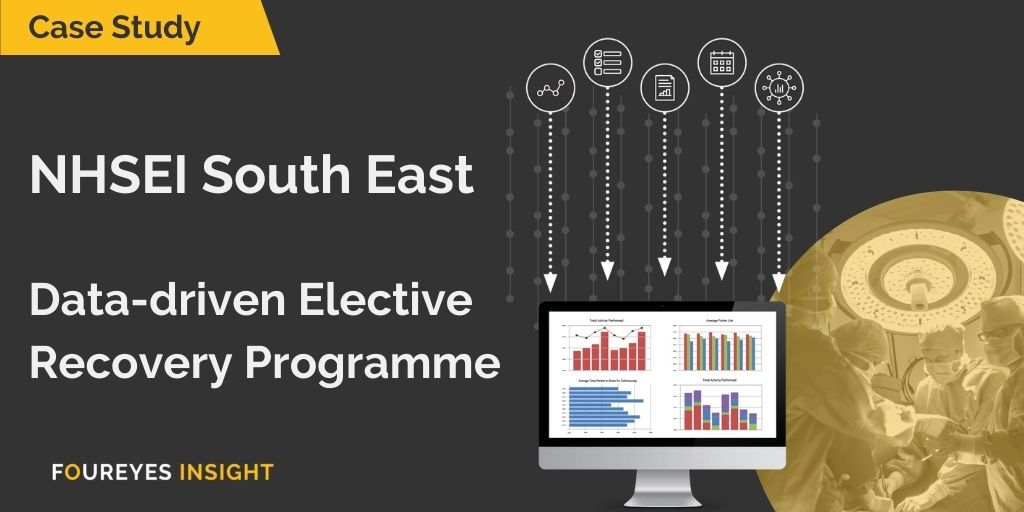
NHSEI – South East commissioned Four Eyes Insight to support their Elective Recovery Support Programme across the region.
Challenge: Recovery plan for post-pandemic waiting lists
Elective waiting lists had risen exponentially across the NHS South East region following the pause of all elective activities due to the pandemic. Increasing waiting times on already overburdened services resulted in a considerable increase in the number of patients who had to wait more than 18 weeks for treatment.
Four Eyes Insight were commissioned to implement a support programme to ensure each of the six trusts nominated across the South East region had a robust recovery plan for high-volume services.
Approach: Combining the power or people, data and technology
Focusing on three specialities of Orthopaedics, ENT and Ophthalmology, the 16-week programme covered six NHS Trusts – one from each Integrated Care System (ICS) across the South East Region.
Four Eyes Insight sought to build robust, deliverable and sustainable improvement plans, as well as identify and implement ‘quick wins’ to inject pace into the programme.
Using Four Eyes Insight technology, analytics and on-the ground-support, phase one – a rapid initial data-gathering exercise was implemented to establish current and historic performance levels – validated with clinical and operational teams.
Following the initial exercise, feedback was gathered from speciality-level team meetings and on-site inspections including, 6-4-2 and Theatre Utilisation Review meetings, from which high-level findings and preliminary recommendations were presented to the programme board and SROs.
Phase two saw a co-developed approach in which bespoke improvement plans for each Trust were agreed upon, and monitoring, delivery and reporting against the plans began – ensuring the programme was kept on track and mitigation actions were taken when required.
A capability and capacity assessment was conducted for each Trust with KPI’s and improvement trajectories agreed upon and monitored as part of internal Trust governance processes.
Results: A data-driven recovery programme
Starting with an initial data analysis exercise which drew a comparison between current and historic (pre-pandemic) performance levels, a pre-pandemic baseline was established which permitted the accurate measurement of relative performance and activity going forward.
Recommendations were further supported by Four Eyes Insight software which used admitted PTL data to explore the backlog, looking at key criteria such as weekly additions, patient priority, procedure types, average touch times and regional comparators.
Utilising this data, demand and capacity modelling was undertaken for each provider, focusing on scenario-based trajectory modelling to improve activity levels to 120% of pre-pandemic levels.
- The analysis highlighted that late starts in theatres were an issue across the region, which was validated directly with clinical and operational leads for each speciality.
- During inspections, it was discovered that the productive and well-organized 6-4-2 approach from one Trust mirrored regional best practices, enabling organisational best practices to be disseminated throughout the region, ensuring the teams are looking 6 weeks out, with good levels of engagement and regularly addressing any blockers.
- The introduction of ‘the perfect morning’ to address late starts, adjustments to in-house opportunity reporting, and re-visiting theatre/estate utilisation were some of the significant cross-cutting recommendations from across the programme.
Positive outcomes for sustainable change
- At both the system and Trust levels there was a positive conclusion, with each Trust having signed-off solid recovery plans that they are currently implementing.
- Capability and capacity assessments were also conducted for each recovery plan, highlighting areas that may need executive support.
- In-depth data analysis was also used to support improvement plans and one NHS Trust now has an elective recovery improvement plan in place, consisting of 22 actions covering five separate categories, with time frames and owners, laying out an agenda for continuous improvement.
A key component of the recovery programme was the identification and sharing of best practices across the South East region, with these methods being identified during the key engagement and observation sessions.
Find out more
Added: w: foureyesinsight.com or e: info@foureyesinsight.com








